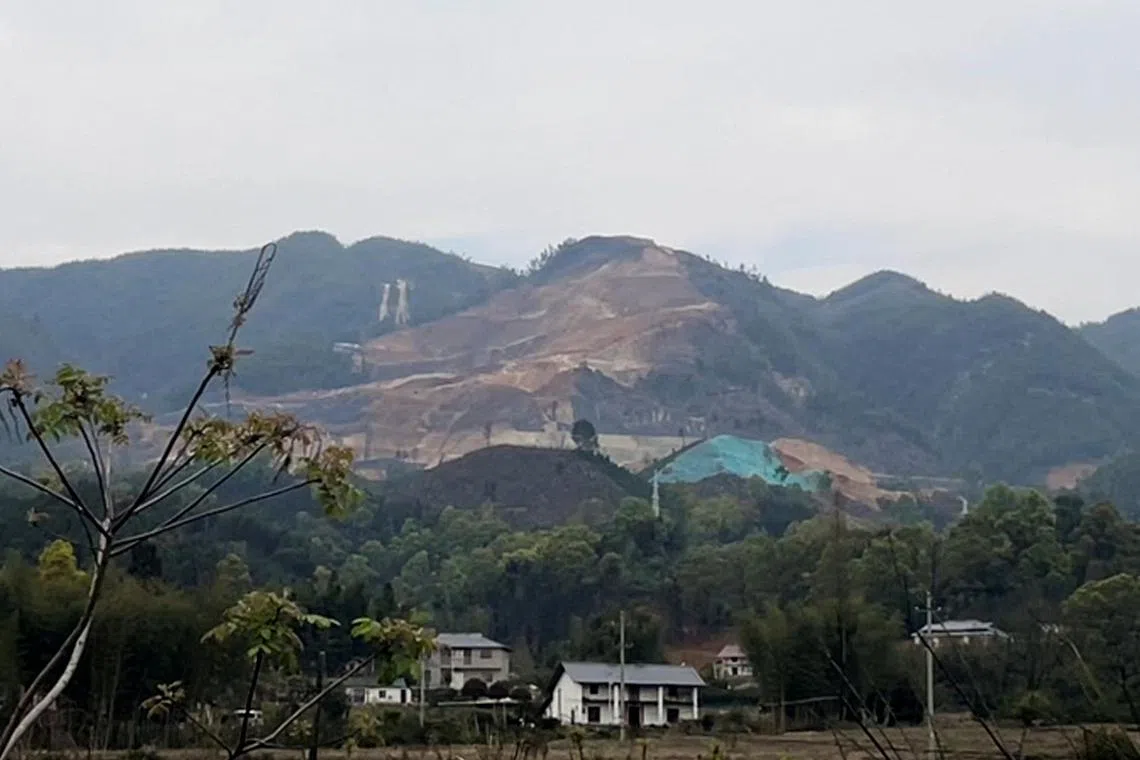Market for battery metal lithium erupts as CATL shuts one of world’s biggest mines
Sign up now: Get ST's newsletters delivered to your inbox

A lithium mine in Yichun, China. The mine closure is seen as another crackdown on overcapacity across China's economy.
PHOTO: REUTERS
Follow topic:
Shanghai - Lithium prices and stocks spiked on Aug 11 after battery giant Contemporary Amperex Technology (CATL) halted operations at a major mine in China, spurring speculation that Beijing might move to suspend other projects as it tackles overcapacity across the economy.
Tianqi Lithium jumped as much as 19 per cent in Hong Kong, while Ganfeng Lithium Group surged 21 per cent, and Australian miners rallied, after CATL confirmed it had shut the mine in Jiangxi province. Prices of the battery metal on the Guangzhou Futures Exchange surged by the daily 8 per cent limit.
The fate of the CATL mine – the biggest in China’s lithium hub of Yichun – had been under close scrutiny for weeks, amid speculation that the authorities would not extend its licence.
The mine accounts for some 6 per cent of global output, according to Bank of America, while other mines in the region account for at least another 5 per cent.
“I think it will mean the lithium price in the near term has a very big upside,” co-head Matty Zhao of China equity research at the lender said in a Bloomberg TV interview.
Lithium producers have struggled with a global supply glut exacerbated by demand headwinds for electric vehicles (EVs), including President Donald Trump’s rollback of incentives for the industry in the US.
In China, the so-called anti-involution campaign has fuelled speculation about a possible crackdown on a sector that is clearly suffering from oversupply.
CATL, the world’s biggest battery producer, said the stoppage would have little impact on its overall operations, and its shares rose as much as 2.8 per cent in Hong Kong before paring about half of the gains.
“For CATL, we do not expect any meaningful operational impact to battery production from the Jiangxi mine suspension,” said Mr Eugene Hsiao, head of China equity strategy at Macquarie Capital.
“The concern from the mine suspension is less on CATL and more on if the broader lithium supply chain can see tighter capacity, and if this will be coordinated via Chinese government actions.”
The “anti-involution” theme has gripped China’s financial markets in recent months, with investors trying to pinpoint industries and companies that might benefit from Beijing-led efforts to tackle deflation and overcapacity. It has encompassed sectors from e-commerce to EVs to steelmaking.
Like many Chinese battery companies, CATL has aggressively expanded investments in minerals from lithium to nickel and cobalt in order to lock in long-term supplies and lower costs.
That vertical integration has in turn aided China’s push to become the world’s leading EV manufacturer.
Traders and industry executives are now watching for other mining curbs around China’s Yichun city, which has emerged as a battery-metals hub.
A local government department has asked eight miners to submit reserves reports by the end of September, according to notes from brokers and analysts, following an audit that found non-compliance in the registration and approvals process.
“CATL’s situation does not change the oversupply structure in the market,” said analyst Zhang Weixin at China Futures.
“However, if production disruption is expanded to other mines in Yichun after Sept 30, the lithium price level could go even higher.” BLOOMBERG

